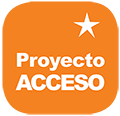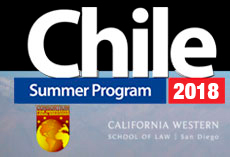Professors Thomas D. Barton and James Cooper Join U.S. Government Delegation and Address World Intellectual Property Organization’s Advisory Committee on Enforcement
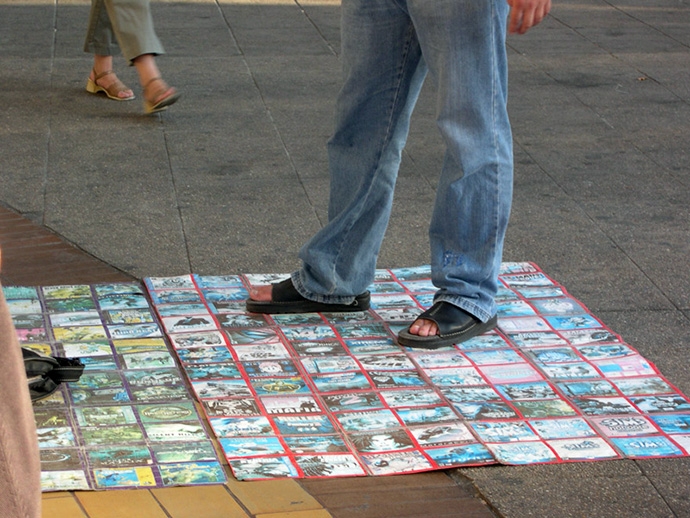
On March 3, 2014, Professors Thomas D. Barton and James Cooper joined the U.S. Government Delegation to the World Intellectual Property Organizations’ (WIPO) Biannual Advisory Committee on Enforcement in Geneva, Switzerland. Professor Cooper said, “It was a great honor to work with Professor Barton and members of the U.S. Patent and Trademark Office to help educate fellow WIPO delegations on the broad panoply of mechanisms to settle IP disputes."
The presentation, Resolving Intellectual Property Problem Through Alternative Dispute Resolution (WIPO/ACE/9/9)) was lauded by the German Government Delegation. WIPO's Deputy Director General Johannes Christian Wichard said, “[the] substantial paper and excellent presentation [were] well received by the participants and contributed to the success of the session of the Committee.”
California Western School of Law Signs an International Cooperation Agreement with the Organization of American States
On March 3, 2015, California Western School of Law signed an international cooperation agreement with the Organization of American States (OAS). OAS Assistant Secretary-General, Ambassador Albert Ramdin signed the agreement along with Niels Schaumann, President and Dean of California Western School of Law at the OAS headquarters in Washington DC.
Proyecto ACCESO Director, Professor James Cooper explained, “This agreement with the OAS demonstrates the seriousness that CWSL is approaching our work in Latin America. The OAS and its Department of International Law are the multilateral leaders in the growth of the judicial section in the region. This agreement will only make our collective work in building the rule of law in the Hemisphere that much more successful.”
The Assistant Secretary General of the OAS, Albert Ramdin, who signed the agreement on behalf of the OAS Secretary General, José Miguel Insulza, said the signing of the agreement seeks to promote cooperation between the two institutions in areas such as legal cooperation projects; joint training activities; and exchanges of experiences and best practices; and therefore he added that the ideal partner within the OAS will be the Department of International Law. “This department plays a key role as legal advisor to the main organs that participate in the elaboration of international norms and also holds the historic memory of legal processes at the OAS.”
For his part, Dean Niels Schaumann, said the CWSL has extensive experience working with Latin America and expressed his conviction that the signing of the agreement with the OAS will open many opportunities to tackle new projects in the coming years. "That's why I'm more than delighted to be here today," added Dean Schaumann.
CWSL has trained thousands of private lawyers, prosecutors, public defenders, judges and students since 1997, working with many stakeholders in more than 15 countries.
CWSL first worked with the OAS just after 9/11 in Costa Rica, bringing lawyers and judges from around the Western Hemisphere to the ACCESO training programs in oral advocacy. Please see http://www.oas.org/juridico/spanish/destrezas_jur%C3%ADdicas_para_el_mile.htm.
For more information about the cooperation agreement please see http://www.oas.org/en/media_center/press_release.asp?sCodigo=E-064/15.



The Trump Administration and the future of the U.S. - Mexico Border
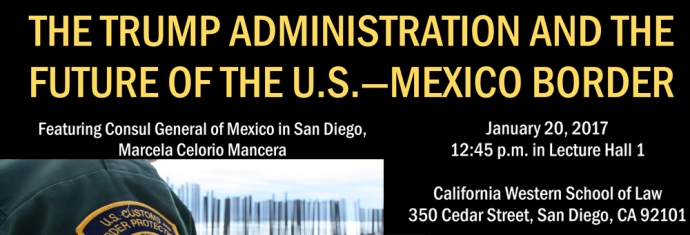
Professor James Cooper, Director of ACCESO, Publishes New Book - Environment and Law in Amazonia: A Plurilateral Encounter
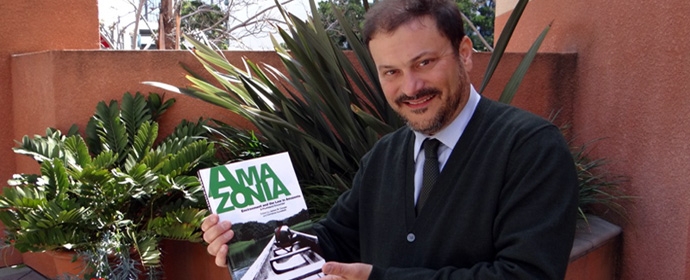
In April 2013, a new edited, interdisciplinary collection about the role of law and the environment in the Amazon region, was published by Sussex Academic Press in the United Kingdom.
Co-edited by ACCESO Director Professor James Cooper and Professor Christine Hunefeldt of the Department of History of the University of California, San Diego (UCSD), the book is the result of a May 2010 international conference, which was co-sponsored by the Center for Iberian and Latin American Studies at UCSD and the International Legal Studies Program at California Western School of Law (CWSL) with support from Title VI of the U.S. Department of Education.
The book is a collection of essays from the various experts including journalists, diplomats, academicians, geographers and social scientists as well as lawyers. It is truly an interdisciplinary effort and includes a DVD with two films - one by Renzo Zanelli and one by Professor James Cooper. Claes Andreasson, of Swedish and US National Public Radio, wrote a chapter and narrated one of the videos on the DVD. He passed away during the final stage of editing of this book and the book is dedicated to his memory.
Amazoniais transnational in nature and reflective of the changing landscape of legal practice today. Increasingly, our lawyers are being asked to help solve problems that transcend border and legal cultures and challenge traditional state actors and institutions. “By providing many perspectives by so many nationalities, this book contributes to the expanding literature that links indigenous activism, corporate profiteering, and regional problem-solving.
Traditionally books about the environment are not inclusive of this many perspective and the kind of plurilateral thinking that went on at the May 2010 conference as reflected in this volume,” explained Professor James Cooper.





ACCESO Capacitación Prepares for Twentieth Anniversary Celebration
On February 16, 2018, Proyecto ACCESO will be celebrating its twentieth anniversary at the inauguration event of the 27th Trial Skills Academy to be held at California Western School of Law in San Diego.
Proyecto ACCESO co-founders Angel Valencia and James Cooper, a Professor of Law at CWSL, as well as long-time instructors Lilia Velasquez, Claudio Pavlic, and Umberto Montiglio are all scheduled to participate.
Sebastian Vives, ACCESO’s communication guru, will be preparing a short video homage to the project’s two decade-long history and will also be in attendance.
www.accesocapacitacion.com
Univision Reports on ACCESO Leadership concerning Rule of Law Efforts in Latin America
Professor James Cooper, Director of Proyecto ACCESO, continues to appear in the Spanish language media to push for the strengthening of the rule of law throughout the Americas.
In late July, he was featured in a Univision News report on the judicial reform sweeping Latin America and the role that Proyecto ACCESO has played in these reforms by training the lawyers and judges of the legal sectors in many of the countries undertaking the reform process.
You can view the report here: http://noticias.entravision.com/san-diego/2015/07/27/buscan-mejorar-sistema-penal-en-latioamerica-para-resaltar-el-estado-de-derecho/.
ACCESO starts Traditional Knowledge investigation and documentary on the Red Warriache of Mapuches in Santiago, Chile
Proyecto ACCESO has long worked to empower indigenous people around Latin America. We have pioneered skills training for indigenous legal defense teams, created community dispute resolution clinics, and expanded traditional justice mechanisms through the development of legislation. As part of our over 15 years of commitment to legal innovation, we now turn our attention to Traditional Knowledge.
Traditional Knowledge refers to the conservation of native sciences, medicine, folklore, artistry and biological diversity within an indigenous culture. This project comprises of multiple components: archiving, publicizing, and promoting the various successes in this emerging arena. All of these are aimed to empower indigenous people and educate the general public. This project is an engine to create an international convention on traditional knowledge, something that the international community has yet to meaningfully address. The program will also demonstrate the mutual and sustainable benefit of bringing together Western-based intellectual property laws and Traditional Knowledge.
This trailer will help you gain a better sense of the commitment of Proyecto ACCESO to TK and most importantly, the necessity of preserving and promoting Traditional Knowledge for the future of our global commons. The project is co-sponsored by UNESCO, through the Ministry of Education of the Republic of Chile.
We are in the middle of a multiple year-long project with the Red Warriache around Chile shall serve as a basis for a study into the challenges and opportunities posed by the integration of traditional medicines into the public healthcare system. The final video shall also serve as the first chapter for a documentary series.
These links of interest demonstrate ACCESO’s long-time commitment to Indigenous issues:
Guaraní Liberty Initiative - http://www.youtube.com/watch?v=w6jYhuBd90k
ACCESO Indígena - http://www.youtube.com/watch?v=_XNY53uV5dw
PSA Bolivia - Towards a New Constituent Assembly – http://www.youtube.com/watch?v=45V7N3mX5Tc
Usos y Costumbres - http://www.youtube.com/watch?v=sVNINJiJ8Ck
A recent graduate of California Western School of Law, Carley Doyle, has worked on the Traditional Knowledge project with Professor James Cooper, Director of ACCESO, and Sebastián Vives del Solar, Chilean film-maker and Director of “Todo Cine” on Canal 13 Cable in Chile. She explained: “There is a lot going on. One day we are looking at Mapuche medicines in the national museum and the next day we are shooting interviews of local leaders and international lawyers working through the legal issues that Traditional Knowledge brings. It is part research, part social activism, and part project management incubation. I love Chile because you can make a change here and see it happen.”
California Western School of Law Student Interns with Legendary Former Judge Juan Guzmán
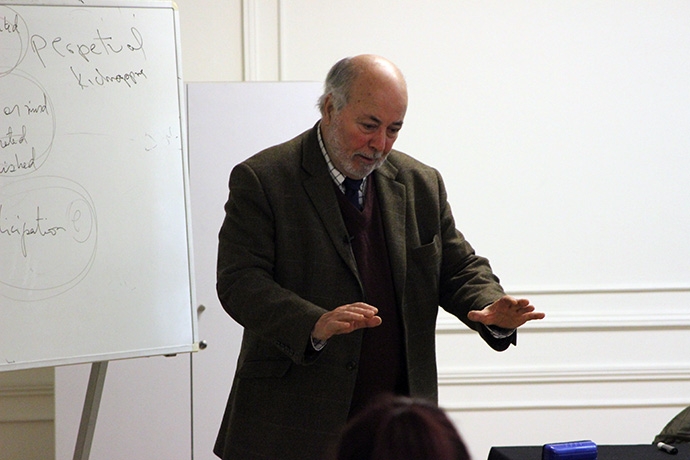
ARCIS University recently reopened after a protracted struggle between university authorities, the Chilean government, the Carabineros (national police), and striking students. Burning tires, tear gas from the police and total chaos near the university’s building limits is the norm. It seems like an odd place for an internship, but that is where Kim Marcus, a law student from the United States interned. Marcus interned alongside Judge Guzmán, the legendary prosecutor who pursued General Pinochet and associates for human rights violations. Marcus has a background in forensic anthropology and Judge Guzmán was an investigating magistrate in Chile’s old criminal law system that used such forensics and pioneered investigative techniques.
Judge Guzman was considered a conservative for many but a hero to others as he pursued the perpetrators of human rights atrocities against Chileans. That is why Marcus wanted to work with Judge Guzmán. Judge Guzman got in deep with his investigations, using science to determine how long iron bars (from train tracks) had been in the sea. These bars were used to wear down political prisoners thrown out of airplanes and helicopters.
On April 30, 2014, Judge Guzmán was appointed the new Director of the ARCIS University’s Law School as the Communist Party withdrew funding and students took the barricades. Marcus experienced Chile like no one else.
Here’s what Marcus wrote about her first day of her internship with Judge Guzman, the very week he was first assuming the Directorship of ARCIS University’s Law School:
The first day of my internship was a unique experience to say the least. I headed off to the Universidad of ARCIS with Judge Guzman around 2:00 pm. He was supposed to sit in on a Bar exam for a sick colleague and we were already late and rushing. As soon as we got close to ARCIS the traffic started backing up. I noticed a plume of grey smoke ahead of us, but I did not think anything of it. Judge Guzman’s phone started ringing and although I do not speak Spanish, I could tell there was a sense of urgency in the conversation. He hung up the phone and said calmly while slightly chuckling, “I think that smoke is coming from the school.”
Of course, as a normal American, I became worry and started wondering if the school was on fire or if a bomb went off. I asked Judge Guzman if everything was alright and again he responds calmly, “Oh yes…the students are just protesting again.” Protesting? Again? His phone rang again and I overheard another conversation with overtones of urgency. He hanged up and said, “well, I have to go to a meeting, so I will leave you with my secretary and he will show you around.” Before I asked what kind of meeting, we arrived at ARCIS to the pile of burning tires, masked students, Carabineros in full riot gear, and a few fire trucks. I asked Judge Guzman if he was worried and he said while laughing, “No, this happens at least once a month."
"The students get angry, they protest, they burn things, and then they go away.” There were too many questions floating around in my head, so I just shut up and watched him maneuver his car around the protest and into the entry of the parking garage that he normally uses to park his car. He honked his horn but the gate did not open. Two times more and no luck. He assumed that because of the protest, they were not going to open the garage so he said with a smile, “we’ll just park on the street.”
We got out of the car, by the time we got around the corner, the burning tires were now just a melted pile of tires in a wet street, and the people had mostly scattered. We walked around the building to the entrance and I saw more smoke, or what I thought was smoke. I thought there was another fire that had started. We walked right into the cloud of smoke, which instantaneously started burning my eyes and throat. I realized it was not ordinary smoke when I started coughing and the tears started pouring down my face. In between coughs I asked Judge Guzman frantically, what is this? What is happening? Again, he replied calmly and with a smile as tears came down his cheeks, “It is tear gas.” People were literally running out of the building.
We were walking right in, no reservations. He told me the air would clear once we were inside. I had my face buried in his jacket. We walked into the quad area where people, I am assuming other faculty, greeted the judge, everyone slightly coughing and rubbing their eyes. He introduced me to his secretary and almost immediately, he took off to his emergency meeting. I was taken to an office where I began my first official day of work at ARCIS. It was anything but just another day at the office.
Marcus eventually provided the foundation for a chapter in Judge Guzmán’s new book on human rights. Her internship was a success in so many ways, not because of the tear gas or chaos or even a sense of reality of how most of Chile lives, but because she was able to spend time with a great jurist and humanitarian, Judge Juan Guzmán.
Claudio Pavlic and ACCESO Team Return to Ecuador
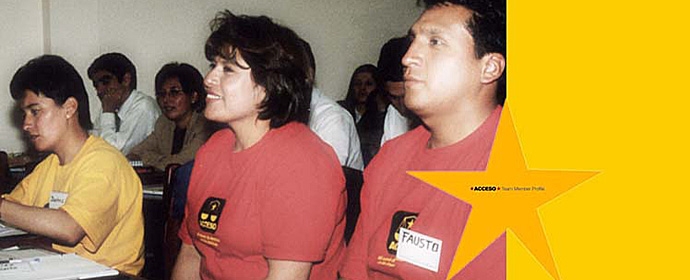
Claudio Pavlic went back in Ecuador after almost a decade since his last visit. The long-time ACCESO Trainer and Proyecto ACCESO’s Academic Director was last in Ecuador for an oral advocacy skills training workshop in Quito in November 2002 on a U.S. State Department training program in oral advocacy coordinated by the U.S. Embassy in Ecuador.
This time, Proyecto ACCESO was contracted by the East West Management Institute’s Strengthening Ecuadorian Justice Project, a three-year initiative funded by the United States Agency for International Development to train 150 lawyers in Ecuador.
Linda Brown, a former Public Defender in San Diego, California, and Max Gould, a Legal Aid lawyer in New York City and longtime ACCESO Trainer, Joined Claudio Pavlic to teaching the workshops. For Pavlic, “It was great to be back in Ecuador after so long. The lawyers are wonderful and ready to participate fully in oral trials.”
The programs ran from April 1 to April 6, 2013 in Guayaquil and from July 29 to August 2, 2013 in Ibarra.
For more information about ACCESO Capacitación's training in oral advocacy, please contact Claudio at [email protected] or Marco Macklis at [email protected].









Intelectual Property Week
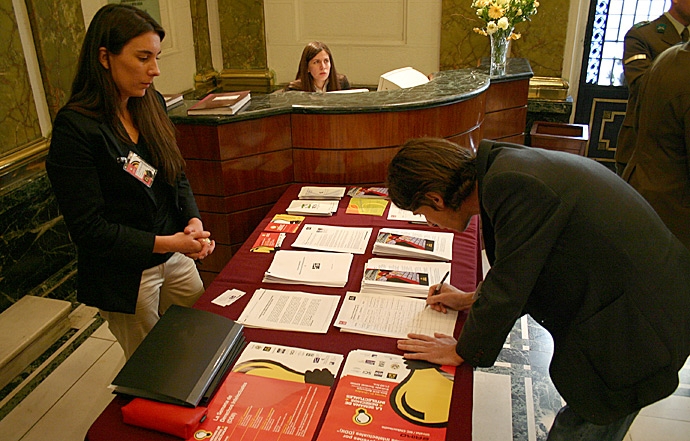
Proyecto ACCESO brought together a coalition of stakeholders fighting IP piracy and produced Intellectual Property Week in Chile in September and October 2004.
The events were sponsored by the U.S. Embassy in Chile and featured a number of cutting-edge programs, including: training workshops for Chilean prosecutors, customs agents, tax collection investigators, and front-line police officers to improve skills in Intellectual Property rights enforcement (taught with support from U.S. prosecutors and FBI agents as instructors); public forums dedicated to building a national consensus to battle piracy; the launching of a middle school curriculum developed to combat Intellectual Property piracy; and a set of workshops for artists and musicians concerning mechanisms to protect Intellectual Property rights.
Since the successes of IP Week, we have educated young people about the dangers of piracy and reached out to fans of cultural industries and held concerts in support of Intellectual Property rights.
We have continued to build national and regional consensus through ACCESO Capacitación skills-building seminars and national roundtable discussions for judges, prosecutors, Congress members, artists, actors, writers, and film-makers concerning intellectual Property rights, their value to innovation and economic growth, and the importance of putting resources into the enforcement of IP rights.
IP Week pictures









ACCESO looks to new reforms for a probation system in Chile
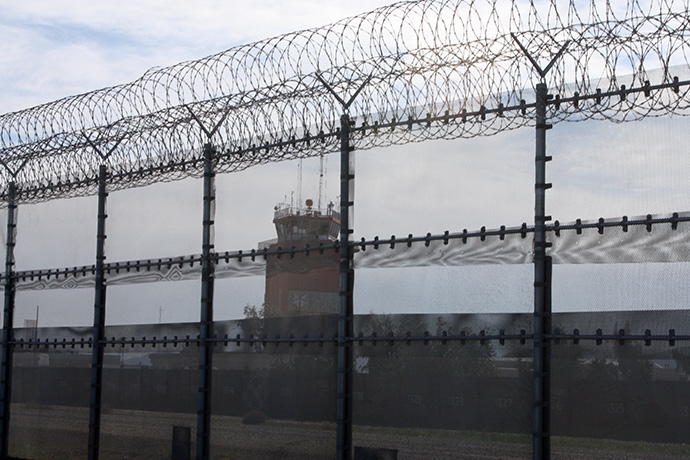
As Chile returns the reigns of government to the Concertación, we see many of the same people working in judicial reform issues. Minister of Justice José Antonio Gomez is back at the helm after much time in Congress as a Senator. He served as Justice Minister in the early 2000’s and worked towards the criminal procedure reform together with former Sub-secretary of Justice Jaime Arrellano, who is now at the helm of the Centro de Estudios de Justicia de las Americas. It is the same faces and often the same institutions.
Together with the Chilean authorities, faith institutions, and social services, a new probation system will be cobbled together. This is not for the faint of heart – it will take ten to fifteen years to accomplish it. Legal reform the first time round – in the late 1990s to reform the Codigo Proceso Penal – took many years to accomplish, but it got done. Chile needs to expand its penal punishment system and include some elements of rehabilitation and a concern for reintegration into society.
For some commentary in Chile about this, please see http://www.elmercurio.com/blogs/busqueda/?query=libertad%20condicional&sort=rank.
Julia Yu, a California Western School of Law student who interned with Fundación Paz Ciudadana, the main proponent of a probation law project in Chile, explains that “this non-profit research think tank influences how laws are made and resources appropriated by new state projects. It’s exciting to see how movements are created; it’s where public policy goes into real effect.” For some of the foundation’s work, please see http://www.pazciudadana.cl/publicacion/conceptos-n-30-redescubriendo-la-libertad-condicional-2/?lang=en.
Proyecto ACCESO will be working in the coming years with other stakeholders in helping build a probation project in its criminal law and social service system. Visit this website again soon for more information on the reform movement and its new activities.
The International Legal Studies Program Spring 2016 Events at California Western School of Law

International Legal Studies Program Spring 2016 Events
at California Western School of Law
January 21 – 12:10 p.m., 2G
Summer Study Abroad Programs Information Event
February 3 – 2:40 p.m., MMR
“The Proliferation of Specialized International Courts”
Colonel Linda Murnane, Special Tribunal for Lebanon, The Hague
February 18 – 10:50 a.m., LH2
International Legal Practice in Asia Panel Discussion
Kam Li, Procopio, Cory; John Grimley, AsiaLawPortal.com; Bill Hornung, Price Horne; and Tara Shah, Conventus Law, Hong Kong
February 19 - 10 a.m.- 3:30 p.m., Boardroom
“Privatization in the International Arena” Conference, co-sponsored by University of California, San Diego, Institute for International, Comparative and Area Studies
Speakers include Paul Verkuil, Former Chair of the Administrative Conference of the United States; Mark Borkowski, Assistant Commissioner, U.S. Customs and Border Protection; Professor Gallya Lahav, SUNY at Stony Brook; Professor Fernando Dias de Simoes, University of Macau; and Michael Flynn, Global Detention Project.
March 3 - 12:10 p.m., 2F
“The OAS Legal System in the Twenty-First Century”
Luis Toro Utillano, Organization of American States
For more information, please contact Professor James Cooper at [email protected].
California Western School of Law and the Fiscalia Nacional (Attorney General) of Chile, signed a cooperative agreement,
California Western School of Law and the Fiscalia Nacional (Attorney General) of Chile, represented by Sabas Chahuán Sarrás, signed a convenio (cooperative agreement).
The Fiscalia Nacional has hosted California Western students for internships over several years in Santiago, Chile, a placement at which students develop skills while gaining valuable international experience and a comparative perspective. Additionally, California Western has worked with Chilean legal and governmental officials to promote the rule of law and facilitates the transformation from an inquisitorial to an adversarial criminal justice system, similar to that of the United States. Through Proyecto ACCESO and the Chile Summer Program, California Western students work with and learn from Chile’s legal officials and scholars. The agreement formalized the long-standing relationship between California Western and Chile’s Fiscalia Nacional.
The convenio has five main objectives:
I. Exchange of legal officials and scholars from both institutions for investigation and assistance in areas of interest;
II. Facilitation of law student exchanges for an opportunity to participate in courses and other academic activities or programs, such as professional social services and professional internships;
III. Assist and promote the fulfillment of academic activities and projects;
IV. Organize and execute capacitation, workshops and conferences of academic courses in areas of interest;
V. Exchange of experiences in common areas.
The Dean and President of California Western School of Law, Niels B. Schaumann, said, “For several years, they have hosted California Western interns, all of whom describe great experiences. We thank them for their support of our programs and the opportunities they provide our students to develop legal skills while gaining valuable international experience. I am excited about the opportunities for additional cooperation that this agreement provides.”
Professor James Cooper, Director of ACCESO, Speaks at International Conference Organized by the Attorney-General’s Office of Chile
On November 26, 2013, Professor James Cooper, Director of Proyecto ACCESO, spoke at an international conference at the University of Chile about the evolving role of the public prosecutor in Chile.
Held at the beautiful Magna Aula at the Facultad de Derecho at the Universidad de Chile, this two day conference also brought a number of international experts including legendary legal reform founder Professor Alberto Binder, German criminal procedure expert Professor Dr. Kai Ambos, and Colombian prosecutor Yeni Fonseca who currently works on prosecuting human rights violations in Guatemala. Attorney-General Sabbas Chahuán hosted the assembled team of experts as over 250 attendees from the Fiscalia Nacional joined in celebrating 15 years of this institution of law enforcement created in the early part of the criminal procedure reform of Chile.
ACCESO Director Interviewed on National Polish Radio about Migration Crisis in the European Union
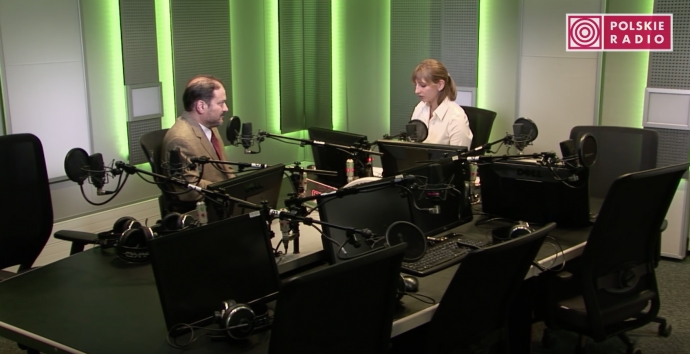
While he was in Warsaw, Poland to give a presentation at the law school at Kozminski University, Professor Cooper appeared on Radio Poland on October 20, 2015 to talk about what the European Union can learn from the United States concerning immigration enforcement and the rise of asylum applications emanating from migrants fleeing Latin America.
You can see the interview here: https://www.youtube.com/watch?v=mWmz6WaaWuU.
ACCESO Director and CWSL Alumnus Publish Opinion Piece on the Changing Nature of Law and Politics in Guatemala
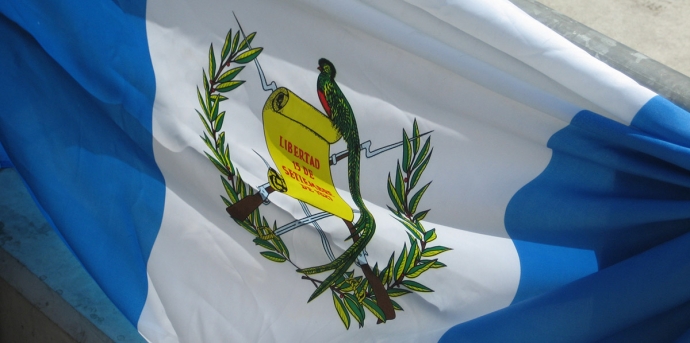
An opinion piece about the leadership changes in Guatemala by Proyecto ACCESO Director and CWSL alumnus Marcelo Rivas was published in the San Diego Union Tribune on September 17, 2015. You can read it here:
http://www.sandiegouniontribune.com/news/2015/sep/17/hints-of-change-being-seen-in-guatemala/.
A Spanish language version of the opinion piece appeared on October 15, 2016 in San Diego’s leading Spanish-language newspaper El Latino. You can read it here:
http://ellatinoonline.com/news/2015/oct/15/guatemala-y-su-mini-primavera-arabe/.
Marcelo Rivas, a former officer cadet in the Guatemalan Army, was a participant in the Chile Summer Program in 2013. He graduated from California Western School of Law in May 2015 and wrote the California State Bar Examination in July 2015.
TPP, Arbitration, and the Future of International Business
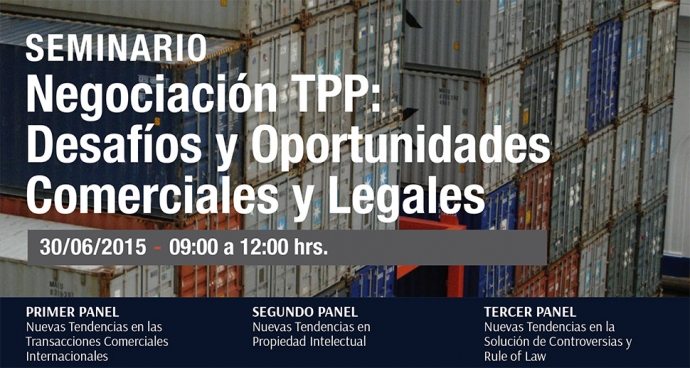
On June 30, 2015 at the Pontificia Universidad Católica de Chile in Santiago, Proyecto ACCESO, with co-sponsors Librotecnia and the Chile-California Council, produced an international seminar on the Trans-Pacific Partnership. You can see the poster for the seminar here.
Speakers came from the Chilean Ministry of Foreign Affairs (Felipe Lopeandia), the Chilean Institute for Intellectual Property (Sergio Escudero), the University of Macau (Fernando Dias de Samoes), the Santiago Chamber of Commerce (Macarena Letelier), California Western School of Law (Thomas D. Barton, James Cooper and Richard Page), as well as the Pontificia Universidad Católica de Chile (Nicolas Cabo, Ignacio Garcia, and Gabriela Novoa).
In light of the stalled conclusion to the Doha Round (Development Round) of liberalized trade negotiations under the World Trade Organization, all eyes are on the TPP to break open traditionally protected countries and create systems of dispute resolution that protect investors as well as labor and environmental standards for all the countries negotiating – including Australia, Brunei, Chile, Japan, Malaysia, Mexico, New Zealand, Peru, United States, and Vietnam.
There also was a launch of the new book by Professors Thomas Barton and James Cooper on Intellectual Property Rights and Alternative Dispute Resolution, published by Editorial Librotecnia.

ACCESO Director Visits Universad de Católica with 20 U.S. Law Students
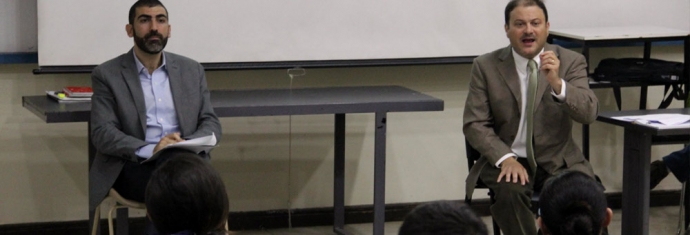
In May 26, 2016, Professor James Cooper, who was in Chile with 20 U.S. law students from two law schools - California Western School of Law and South Texas College of Law, spoke at Universidad Católica in Santiago, Chile.
The class was held in conjunction with the class of Professor Jorge Sahd of Universidad Católica.


Mexico Moot Court Finals
Proyecto ACCESO with the Institute for Criminal Defense Advocacy’s California Innocence Project at California Western School of Law won a grant in 2013 to create and rollout a national moot court competition in Mexico.
The program, which started in 2014, was funded by the U.S. Department of State. A final competition in Year One of the program occurred on July 13, 2015 in Washington DC.
For more details, please see https://www.cwsl.edu/news/newsroom/campus-news/2015/07/22/mexican-moot-court-team-coached-by-california-western-excels-at-competition-in-washington-dc.
